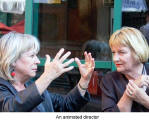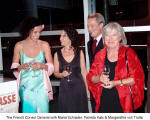
Filmfest Stories
by Sybille Forster-Rentmeister
Margarethe von Trotta
Not only did I see several German movies, we especially followed Margarethe von Trotta during her visit in Toronto. She proved to be more than a worthwhile subject to observe. No matter where she appeared her personality won everyone over instantly. Her natural and easy way of communication did not at all reflect her fame and status. She is a woman working in film, knows all the trials and tribulations of her industry and recommends to anyone who wants to succeed in this business to be ready for a fight. "You really have to be certain that this is what you want to do", she told young aspiring filmmakers in a panel discussion. She quoted Johann Wolfgang von Goethe to the audience: "Dreams are the premonitions of ability!"
How true! Without the dreams of the artists, there would not be much future in anything. This is a recurring point of discussions I am having with any artist I meet and it is amazing to hear how strong the agreement on this point is among them. Jules Verne and Leonardo da Vinci are only 2 of the most obvious examples.
 At
the reception the Goethe Institutes gave in her honour just before the Gala
in Roy Thomson Hall around the corner she mingled freely with diplomats,
film fest types and members of the local business community. There was no
one who did not have considerable admiration for her filmmaking abilities
and she rewarded everyone with her very personal comments.
At
the reception the Goethe Institutes gave in her honour just before the Gala
in Roy Thomson Hall around the corner she mingled freely with diplomats,
film fest types and members of the local business community. There was no
one who did not have considerable admiration for her filmmaking abilities
and she rewarded everyone with her very personal comments.
As a director she is an actor’s dream come true, as her artists will readily attest to, perhaps because she was an actress herself and understands the creative process very well from all sides, not just the technical ones, which she learned from ex-husband Volker Schloendorf during their collaborations. In her speeches she showered her talents with much praise, diverting attention away from herself as much as possible, yet graciously accepted the ovations given her.
She is aware that she is more appreciated elsewhere than in Germany, but we hear that her movie Rosenstrasse is now running in Germany and well liked, despite the not so enthusiastic reviews of some critics.
 In
a personal interview we spoke about critics and their job of having to
review a film from a professional "hat". This appears not to leave enough
room for a fair and well-rounded point of view, she feels.
In
a personal interview we spoke about critics and their job of having to
review a film from a professional "hat". This appears not to leave enough
room for a fair and well-rounded point of view, she feels.
I saw Rosenstrasse two times myself: before the Film
Fest, reported on already in the last issue, and again at the gala. I too
had to admit that the first time I did not allow myself the luxury of full
spectatorism.
I suppressed all urges of emotions to surface. I kept my hat as a reviewer
on at almost all times, was not willing to be an effect. But when I saw the
film a second time, at the gala, in the safety of a balcony seat, I allowed
myself to experience the full impact of the communication of the film and
its message. And this time the emotional impact made me cry.
 The
use of symbolism is in von Trotta’s hands a powerful tool for reaching into
our souls. The many nuances of grief, anger, astonishment, fear, terror and
complacency she manages to get out of players was not so apparent on the
small review screen at the Film Institute before the festival, but on the
big screen in Roy Thomson Hall it became very apparent that this was a great
artistic collaboration of talent.
The
use of symbolism is in von Trotta’s hands a powerful tool for reaching into
our souls. The many nuances of grief, anger, astonishment, fear, terror and
complacency she manages to get out of players was not so apparent on the
small review screen at the Film Institute before the festival, but on the
big screen in Roy Thomson Hall it became very apparent that this was a great
artistic collaboration of talent.
Margarethe von Trotta knows about the conundrum that reviewers have to cope with. Often times it happens that several viewings will change a critics mind, as colleagues have attested to. This would be especially important for a movie with a more serious theme, such as Rosenstrasse. It is a movie that is not out to entertain, but to enlighten while not missing engaging and entertaining elements.
The usual European concerns in regards to the Hollywood machine do not apply to her, she said. "I am a European and I make European movies. There is no danger of them to come running for me" she laughs.
By the same token she told me on the patio of the Intercontinental Hotel that it was Hollywood and the movie Schindlers List that made Rosenstrasse more possible. Without the Hollywood nod that in fact there were a few good Germans during the oppressive dictatorship of the Third Reich no one would have been interested in supporting a project dealing with Germans that show tremendous civil courage in the face of sheer overwhelming suppression.
This change in attitude towards history and the arts that deal with the subject matter is to be welcomed in a world that is still embroiled in bloody disputes. A movie like Rosenstrasse serves as a reminder that courage is a desirable character trait worth emulating.
Rosenstrasse was fortunate in picking up a North-American distribution deal during Toronto’s International Film Festival. Look out for this important movie, which will be shown here perhaps as early as January. The art of Margarethe von Trotta has yet again the power to shift viewpoints and perceptions.
Her next project she would like to be a bit closer to present times, perhaps a story about the STASI. We can hardly wait.
Since Margarethe von Trotta worked for many years with Rainer Werner Fassbinder you might want to rekindle your acquaintance with this famous German filmmaker. Toronto Cinemateque is presenting a comprehensive retrospective. "Imitations of Life" runs from Oct. 17 to Dec. 3, showcasing 23 films. No doubt your favourite is among another grouping of "Close to Heaven". Details at www.bell.ca/cinematheque .



